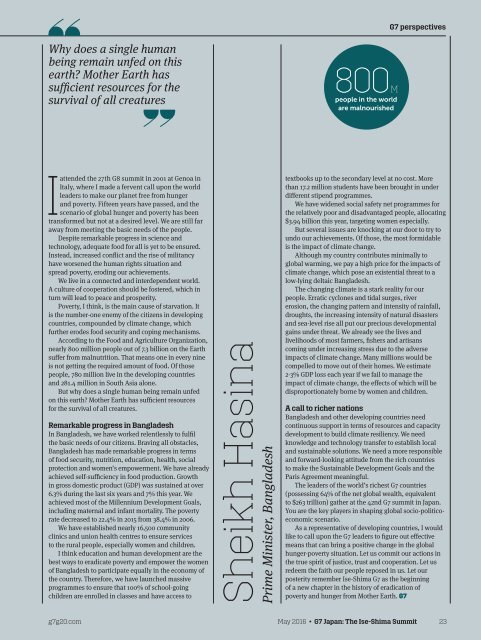G7_JAPAN
Create successful ePaper yourself
Turn your PDF publications into a flip-book with our unique Google optimized e-Paper software.
<strong>G7</strong> perspectives<br />
Why does a single human<br />
being remain unfed on this<br />
earth? Mother Earth has<br />
sufficient resources for the<br />
survival of all creatures<br />
800M<br />
people in the world<br />
are malnourished<br />
I<br />
attended the 27th G8 summit in 2001 at Genoa in<br />
Italy, where I made a fervent call upon the world<br />
leaders to make our planet free from hunger<br />
and poverty. Fifteen years have passed, and the<br />
scenario of global hunger and poverty has been<br />
transformed but not at a desired level. We are still far<br />
away from meeting the basic needs of the people.<br />
Despite remarkable progress in science and<br />
technology, adequate food for all is yet to be ensured.<br />
Instead, increased conflict and the rise of militancy<br />
have worsened the human rights situation and<br />
spread poverty, eroding our achievements.<br />
We live in a connected and interdependent world.<br />
A culture of cooperation should be fostered, which in<br />
turn will lead to peace and prosperity.<br />
Poverty, I think, is the main cause of starvation. It<br />
is the number-one enemy of the citizens in developing<br />
countries, compounded by climate change, which<br />
further erodes food security and coping mechanisms.<br />
According to the Food and Agriculture Organization,<br />
nearly 800 million people out of 7.3 billion on the Earth<br />
suffer from malnutrition. That means one in every nine<br />
is not getting the required amount of food. Of those<br />
people, 780 million live in the developing countries<br />
and 281.4 million in South Asia alone.<br />
But why does a single human being remain unfed<br />
on this earth? Mother Earth has sufficient resources<br />
for the survival of all creatures.<br />
Remarkable progress in Bangladesh<br />
In Bangladesh, we have worked relentlessly to fulfil<br />
the basic needs of our citizens. Braving all obstacles,<br />
Bangladesh has made remarkable progress in terms<br />
of food security, nutrition, education, health, social<br />
protection and women’s empowerment. We have already<br />
achieved self-sufficiency in food production. Growth<br />
in gross domestic product (GDP) was sustained at over<br />
6.3% during the last six years and 7% this year. We<br />
achieved most of the Millennium Development Goals,<br />
including maternal and infant mortality. The poverty<br />
rate decreased to 22.4% in 2015 from 38.4% in 2006.<br />
We have established nearly 16,500 community<br />
clinics and union health centres to ensure services<br />
to the rural people, especially women and children.<br />
I think education and human development are the<br />
best ways to eradicate poverty and empower the women<br />
of Bangladesh to participate equally in the economy of<br />
the country. Therefore, we have launched massive<br />
programmes to ensure that 100% of school-going<br />
children are enrolled in classes and have access to<br />
Sheikh Hasina<br />
Prime Minister, Bangladesh<br />
textbooks up to the secondary level at no cost. More<br />
than 17.2 million students have been brought in under<br />
different stipend programmes.<br />
We have widened social safety net programmes for<br />
the relatively poor and disadvantaged people, allocating<br />
$3.94 billion this year, targeting women especially.<br />
But several issues are knocking at our door to try to<br />
undo our achievements. Of those, the most formidable<br />
is the impact of climate change.<br />
Although my country contributes minimally to<br />
global warming, we pay a high price for the impacts of<br />
climate change, which pose an existential threat to a<br />
low-lying deltaic Bangladesh.<br />
The changing climate is a stark reality for our<br />
people. Erratic cyclones and tidal surges, river<br />
erosion, the changing pattern and intensity of rainfall,<br />
droughts, the increasing intensity of natural disasters<br />
and sea-level rise all put our precious developmental<br />
gains under threat. We already see the lives and<br />
livelihoods of most farmers, fishers and artisans<br />
coming under increasing stress due to the adverse<br />
impacts of climate change. Many millions would be<br />
compelled to move out of their homes. We estimate<br />
2-3% GDP loss each year if we fail to manage the<br />
impact of climate change, the effects of which will be<br />
disproportionately borne by women and children.<br />
A call to richer nations<br />
Bangladesh and other developing countries need<br />
continuous support in terms of resources and capacity<br />
development to build climate resiliency. We need<br />
knowledge and technology transfer to establish local<br />
and sustainable solutions. We need a more responsible<br />
and forward-looking attitude from the rich countries<br />
to make the Sustainable Development Goals and the<br />
Paris Agreement meaningful.<br />
The leaders of the world’s richest <strong>G7</strong> countries<br />
(possessing 64% of the net global wealth, equivalent<br />
to $263 trillion) gather at the 42nd <strong>G7</strong> summit in Japan.<br />
You are the key players in shaping global socio-politicoeconomic<br />
scenario.<br />
As a representative of developing countries, I would<br />
like to call upon the <strong>G7</strong> leaders to figure out effective<br />
means that can bring a positive change in the global<br />
hunger-poverty situation. Let us commit our actions in<br />
the true spirit of justice, trust and cooperation. Let us<br />
redeem the faith our people reposed in us. Let our<br />
posterity remember Ise-Shima <strong>G7</strong> as the beginning<br />
of a new chapter in the history of eradication of<br />
poverty and hunger from Mother Earth. <strong>G7</strong><br />
g7g20.com May 2016 • <strong>G7</strong> Japan: The Ise-Shima Summit 23
















